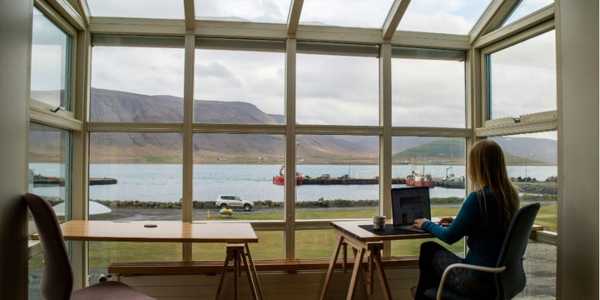The Impact of Remote Work on Travel Trends
The advent of remote work has brought us in a new era of travel, fundamentally altering traditional patterns and expectations. As more individuals and businesses embrace the flexibility of working from anywhere, the tourism industry is undergoing a transformative shift. This article explores how remote work is reshaping travel trends and creating new opportunities for both travelers and the hospitality sector.
The Rise of the Digital Nomad

Remote work has given birth to a new breed of traveler: the digital nomad. These individuals have untethered themselves from traditional office settings, opting instead for a lifestyle that blends work and leisure.
Digital Nomad Lifestyle
Digital nomads prioritize destinations that offer a conducive environment for work and play. Cities with strong digital infrastructure, affordable living costs, and vibrant cultural scenes have become hotspots. Popular destinations include Bali, Chiang Mai, Lisbon, and Medellín, each offering unique experiences that cater to this mobile workforce.
Accommodations and Workspaces
The surge in demand for accommodations that cater to remote workers has led to the growth of co-living and co-working spaces. These facilities provide not only a place to stay but also community and networking opportunities. Co-working spaces offer high-speed internet, comfortable workstations, and meeting rooms, creating an ideal environment for productivity.
The Blurring Lines between Work and Leisure: Bleisure Travel
The concept of "bleisure," a combination of business and leisure travel, has gained significant traction. With the ability to work remotely, many professionals are extending their business trips to incorporate leisure activities.
Bleisure Trends
Professionals are increasingly looking to extend their stay in business destinations to explore local attractions and unwind after meetings. This trend has led to increased demand for hotels and accommodations that offer a balance of work and relaxation amenities. Additionally, it has spurred the growth of destination-based co-working spaces and business centers.
Impact on Hospitality
Hotels are adapting to the bleisure trend by offering amenities such as high-speed internet, business centers, and leisure facilities. Flexible check-in/check-out times, wellness programs, and local experience packages are becoming standard offerings. This shift is transforming the traditional business trip into a more holistic travel experience.
Longer Stays and Seasonal Shifts
Remote workers often opt for longer stays in their chosen destinations, allowing them to immerse themselves in local culture and experience the area like a resident. This shift has impacted the hospitality industry, with an increased demand for serviced apartments, vacation rentals, and long-term accommodation options.
Extended Stays
Extended stays provide remote workers with stability and the opportunity to deeply engage with their surroundings. Platforms like Airbnb have introduced monthly rental options, catering to this new segment of travelers. The demand for fully-equipped kitchens, laundry facilities, and home-like comforts is on the rise.
Redistribution of Travel Patterns
Remote work has led to a redistribution of travel patterns throughout the year. The traditional peak travel seasons are becoming less pronounced as remote workers can choose to work from popular destinations during off-peak periods. This has created opportunities for tourism boards and businesses to attract visitors year-round, promoting lesser-known attractions and local experiences.
The Search for Ideal Work and Living Environments
Remote workers are actively seeking destinations that offer a desirable combination of work and lifestyle factors. This includes climate, cost of living, access to outdoor activities, and a strong digital infrastructure.
Factors Influencing Destination Choice
● Climate and Natural Beauty: Many remote workers prefer locations with favorable weather and access to nature, such as beaches, mountains, or parks.
● Cost of Living: Affordable destinations allow remote workers to maintain a comfortable lifestyle without financial strain.
● Digital Infrastructure: Reliable high-speed internet and co-working spaces are essential for productivity.
● Cultural and Recreational Activities: Proximity to cultural sites, restaurants, and recreational activities enhances the overall experience.
Emerging Remote Work Hubs
Destinations that were once considered off-the-beaten-path are now gaining popularity as remote work hubs. Countries like Portugal, Mexico, and Estonia have introduced digital nomad visas, making it easier for remote workers to live and work there legally. These destinations offer a mix of affordability, cultural richness, and modern amenities.

Challenges and Opportunities
While remote work has opened up new possibilities for travel, it has also presented challenges. Overtourism in popular remote work destinations has become a growing concern.
Overtourism
Popular remote work destinations face the challenge of managing increased tourism without compromising the local way of life. Issues such as rising living costs, environmental degradation, and strain on infrastructure need to be addressed.
Opportunities for Lesser-Known Destinations
Remote work has created opportunities for smaller, less-known destinations to attract visitors. By focusing on providing a suitable work environment and promoting their unique offerings, these destinations can benefit from the growing remote work trend. Investments in digital infrastructure, marketing campaigns, and collaborations with local businesses can help these areas thrive.
The Future of Travel
The impact of remote work on travel is still unfolding. As technology continues to advance and work-from-anywhere policies become more prevalent, we can expect to see further transformations in the travel industry.
Technological Advancements
Advancements in technology, such as improved internet connectivity, virtual reality, and collaboration tools, will continue to support the remote work trend. These innovations will make it easier for remote workers to stay connected and productive, regardless of their location.
Redefining Traditional Vacations
The rise of digital nomads and the increasing flexibility of work arrangements are likely to redefine the concept of traditional vacations. Travelers will seek experiences that combine productivity, relaxation, and cultural immersion. The lines between work, travel, and leisure will continue to blur, creating a new paradigm for the travel industry.
Adapting to Changing Demands
The hospitality industry will need to adapt to these changing demands by offering a variety of accommodation options, flexible booking policies, and amenities that cater to the needs of remote workers.
Sustainable and Community-Centric Tourism
As remote workers become more conscious of their environmental and social impact, there will be a greater emphasis on sustainable travel practices. Eco-friendly accommodations, responsible tourism initiatives, and support for local businesses will become more prevalent. This shift towards sustainability will help preserve destinations for future generations while benefiting local communities.
Wrapping Up
Remote work has fundamentally reshaped the travel landscape. By offering unprecedented flexibility and freedom, it has empowered individuals to explore the world while maintaining their professional lives.
The future of travel will be characterized by a seamless integration of work and leisure, personalized experiences, and a commitment to sustainability. The rise of digital nomads, bleisure travel, and the search for ideal work environments are just the beginning.